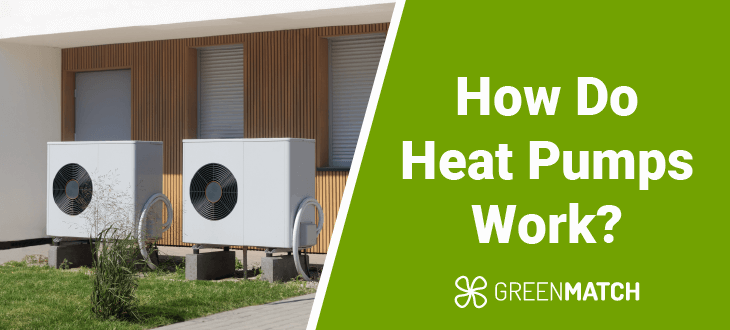Answer these simple questions and we will find you the BEST prices
Which type of solar quotes do you need?
It only takes 30 seconds
100% free with no obligation

Get up to 4 quotes by filling in only 1 quick form

Install a heat pump for less with the BUS grant

We’ve helped over 500,000 homeowners reduce their carbon footprint
- GreenMatch
- Heat Pumps
- How Do Heat Pumps Work in the UK?
How Do Heat Pumps Work in the UK? (2025)


- A heat pump is an energy-efficient heating and cooling device used in houses or other larger buildings.
- Heat pumps work by transferring thermal energy to where it is needed, either indoors or outdoors, using a refrigeration cycle.
- There are several types of heat pumps: air-, water-, ground source and hybrid heat pumps.
A heat pump can be an excellent way of heating or cooling your home, with minimal carbon emissions and higher energy efficiency than traditional heating systems that use fossil fuels. By choosing a heat pump, you will not only get better heating but also save on your utility bills.
This guide will walk you through how the different types of heat pumps function. After reading this guide, you will be well-equipped with all the necessary information about the best heat pumps in the UK so you can decide whether heat pumps are suitable for your heating or cooling needs.
If, by the end of the guide, you do decide to install heat pumps, you will need a reliable and trustworthy heat pump installer. They can provide you with services tailored to the needs of your house. However, finding and vetting installers on your own can be a stressful, days-long process to find and vet installers who offer the best prices.
Fortunately, we have a solution for you. Just fill out our 30-second form, answer a few questions, and receive up to 4 free, non-binding quotes from our network of vetted heat pump installers. We've simplified the process so you can easily find the right installer.
Click the button below to begin!
- Quotes from local engineers
- Payment by finance available
- Save £7,500 with BUS grant
It only takes 30 seconds



What is a heat pump?
A heat pump is an appliance that transfers thermal energy from one place to another, used for heating or cooling buildings. It works on the principle of extracting and moving heat rather than generating it, which makes it highly energy-efficient.
Heat pumps can extract heat from various sources, such as air, water or the ground, and they can reverse their operation to either heat or cool a space. They are also a highly efficient means of heating and cooling.
The different types include air source, ground source, and water source heat pumps. Hybrid heat pumps are a combination of heat pumps and boilers. There are also high temperature heat pumps which produce more heating compared to other heat pumps.
The efficiency of a heat pump is measured by its coefficient of performance (COP), which is typically between 3 and 4. This means that a heat pump can produce 3-4 units of heat energy for every unit of electrical energy consumed.
In simpler terms, for every unit of electricity it uses, a heat pump can produce three to four times as much heat as a standard boiler, making it a highly efficient heating solution. You can replace your boiler with a heat pump for better energy efficiency and low energy costs. There are also different heat pump sizes to address different levels of heating needs.
How do the different heat pump types work?
Heat pumps transfer heat using a refrigeration cycle. They absorb heat from a low-temperature source with a refrigerant, which is then compressed to raise its temperature.
The heated refrigerant releases heat indoors via a heat exchanger, then cools down and repeats the process, efficiently maintaining indoor temperature. A qualified installer can provide more details.
Finding a trustworthy heat pump installer can be time-consuming and drag on for days. You can avoid wasting hours of your time with the help of our hassle-free service. Our network of vetted heat pump installers ensures that you receive high-quality service at competitive prices. Simply fill out our 30-second form, answer a few questions, and receive up to 4 free, non-binding quotes from our network of reliable installers.
- Quotes from local engineers
- Payment by finance available
- Save £7,500 with BUS grant
It only takes 30 seconds



How do air source heat pumps work?
Air source heat pumps (ASHPs) extract thermal energy from the air outside to either water or air inside the house. There are two types of air source heat pumps: air to air and air to water. The air source heat pump installation includes the refrigeration system with a compressor, one outdoor and one indoor coil with aluminium fins and a reversing valve.
- Air to air heat pumps: They are usually used in small houses and consist of an indoor and outdoor unit. They heat the air inside the house with the help of fan coil units, also called blowers, or through air ducting pipes. Blowers are mounted on the wall, and air ducts are mounted inside ceiling voids.
This mechanism eliminates the need for a wet central heating system, which makes it relatively easy and cheap to install. Air to air heat pumps are also known for their quiet operation and can provide both heating and cooling, making them a versatile and cost-effective solution for smaller homes.
However, this system can only be used for heating and cooling the air inside the house; you will need an air to water heat pump for hot water on tap. They cost around £2,400 - £8,800 for a full installation. You can also combine air source heat pumps with solar panels for your heating needs.
- Air to water heat pumps: They transfer the thermal energy extracted from the outside air to an evaporator coil filled with refrigerant, which then repeats the same process for heating.
The difference here is that the heat exchanger transfers the heat to water. The heated water is then circulated through radiators, used for underfloor heating, or stored for other domestic uses.
You can use the heat pump for cooling as well because of the presence of the reversing valve. These heat pumps cost around £8,750–£14,050.
How do ground source heat pumps work?
Ground source heat pumps (GSHPs) or geothermal heat pumps transfer heat from the ground outside to provide heating inside the house. These heat pumps use pipes buried under the ground to extract heat at low temperatures into a liquid circulating in the pipes.
The heat is then passed through the refrigerant, which is compressed to raise its temperature. The heat exchanger extracts the heat and transfers it to radiators or an underfloor heating system. It can also be used to heat water for hot water on tap.
Ground source heat pumps can be used throughout the year for heating purposes. This because the ground stays at a constant temperature throughout the year under the surface. Ground source heat pumps are the most expensive types of heat pumps, with prices ranging from £23,200 to £49,000.
How do hybrid heat pumps work?
Hybrid heat pumps combine the functionality of an air-source heat pump with a traditional gas or oil boiler to optimise heating efficiency and flexibility in the UK.
In these systems, the heat pump, which can extract heat from the air even at low temperatures, operates as the primary heating source when outdoor temperatures are mild. This allows the system to capitalise on the heat pump's high efficiency.
That said, it's important to also consider the question "How do heat pumps work in winter?" when accounting for heat pump efficiency. During colder weather, the efficiency of an air source heat pump tends to drop. That's why a hybrid heat pump can come in handy, as the boiler takes over to provide reliable and powerful heating.
A smart control system monitors the outdoor temperature and energy demand, switching seamlessly between the heat pump and the boiler to ensure optimal performance, cost-effectiveness, and comfort.
This hybrid approach not only enhances energy efficiency but also reduces carbon emissions and heating costs. This system can be ideal for larger homes with poor insulation where the heating demand is more than what the heat pump alone can cater to. They can cost anywhere from £10,250 to £18,550.
Is a heat pump the right choice for your home?
If you are looking for a low-carbon heating system that also saves on energy costs, heat pumps might be the right choice for you. Heat pumps can achieve efficiency levels of 300%-400%, which is much better than the efficiency of traditional boilers.
The versatility of heat pumps allows you to address your heating, cooling and hot water needs. They also have low maintenance costs (1-2 checks a year) and long lifespans of 10-15 years. Air source heat pump costs differ according to the type, but several government heat pump grants offset these costs.
To understand what type of heat pump will suit your specific energy needs and what grants you can take advantage of, you will need to consult a heat pump expert. To get in touch with reliable industry experts, you can use GreenMatch’s easy service.
Simply fill out our 30-second form and get up to 4 free and non-binding quotes from our network of vetted installers. Compare the prices and choose the best option! Click the button below to get started!
- Quotes from local engineers
- Payment by finance available
- Save up to £1,567 per year
It only takes 30 seconds



FAQ
In winter, a heat pump works by extracting heat from the outside air or ground and transferring it indoors, even when temperatures are low. The process involves a cycle of evaporation and condensation using a refrigerant.
A heat pump works like an air conditioner in both directions. It can cool your house in the summer by removing heat and warm your house in the winter by moving heat from outside.

Anjana has a knack for simplifying complex concepts in an engaging way. She has a background in digital journalism and is committed to delivering impactful content about sustainability and solar energy.
We strive to connect our customers with the right product and supplier. Would you like to be part of GreenMatch?

